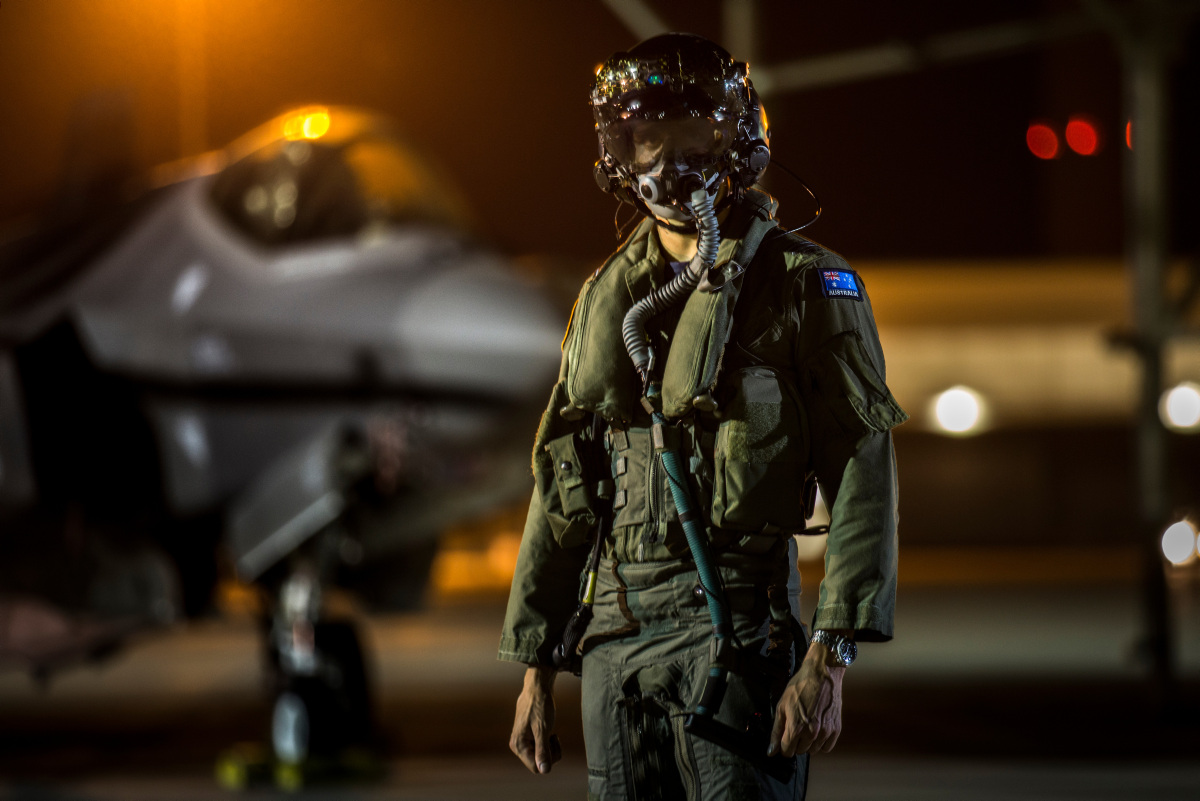
Super-fast machine processing will increase the speed of modern warfare, but skilled men and women will remain the crucial decision-makers, say Australia’s air force commanders.
RAAF chief Air Marshal Leo Davies and deputy chief Air Vice-Marshal Gavin Turnbull tell The Strategist that the brain may not be able to process data fast enough in future combat and the human will need to harness the speed of artificial intelligence to process all the available options. But the result of this process of ‘augmented intelligence’ needs to remain a decision made by the human.
Davies says a machine is not currently able to both make decisions and take part in combat. ‘We can program it to learn, but it learns linearly, it is not emotional and it is in many respects, in an air combat sense, quite inflexible. When we look at a pilot’s ability to assess the situation, that brings with it an amount of emotion and creativity that allows us to be agile.
‘We need the flexibility and agility of the human meshed with the speed of a machine. When we put those together, we’ve got a quite amazing outcome’, Davies says.
In the modern pilot, skills such as systems management and being able to categorise mixed options and select the correct one are as important as physical flying skills, he says.
‘At the core of what we need to do next is attracting, recruiting, training and retaining the workforce that will fly these aircraft, drive the tank, fly the helicopter, or sail the ship or submarine. The workforce that we will have across the ADF in 10 years’ time must be different to the workforce we had 10 years ago to maximise all this good gear’, Davies says.
He says this is an evolution of the RAAF’s Plan Jericho, designed to enable it to innovate faster than anybody else.
Turnbull says the ADF can exploit its advantages in being a small military which can gain maximum value from an investment in human–machine teaming. ‘We will work to make ourselves unique in that respect, because we have an agility that larger forces don’t have, and an ability to combine the innovation in our people with the future of machine teaming to accelerate the tempo in the operational domain and create very quick effects that provide conundrums and difficulties for any adversary we may have’, he says.
‘In terms of bang for buck, it’s how we can have the biggest effect in making our people successful in any combat environment that they may have to enter.
‘We have to be able to provide a level of deterrence that means, if you snap at us and we have to bite, it’s going to hurt.’
Turnbull says the RAAF is getting serious now about understanding what the F-35 brings to the joint force. ‘We’re understanding that the force mix we’ll have in the future will overwhelm us with the amount of information that we can produce, and we need to get much smarter about how we deal with that.’
The goal is an ADF that is much more powerful than the sum of its parts.
Aircraft such as the F-35, the Wedgetail, the Growler and the Super Hornet have all come along linear development paths, he says. ‘Our concept of edge processing will allow us to fully develop the capabilities of each of those linear paths, to intercept and fuse into the future. They can do highly advanced and highly effective processing on each of those platforms while communicating with each other about the information they’re gathering. And then, from the edge of that battlespace, we transmit back knowledge—not reams and reams of something that needs to be processed by lots of humans or computers.’
No matter how powerful a computer is, success will come down to the RAAF’s people, Turnbull says, and that comes down to the time and effort put into their professional training.
‘People are our quality edge. That will never change. The development of artificial intelligence is a long way off replacing the human, but certainly it is a lot closer for that intelligence to augment the ability of the human to do things that the machine currently can’t. It allows the human inside the system to make quality judgements based on the ubiquitous but accurate information and to direct the artificial systems where to go, or to respond to key decisions that the machine will elevate to the human when necessary.
‘The type of individuals that we need are not particularly different to those that we currently take, but the path that we lead them through, in their professional development, will be different. And these are the individuals who understand cyber and they understand physical systems, but more importantly, they understand a systemic approach to teaming machines with humans. And that is quite a new area.’
The air campaign in Iraq and Syria has demonstrated that human judgement is still crucial in terms of issues such as when to bomb and when not to bomb.
So does all of this lead to, or away from, an ultimate switch to unmanned combat aircraft?
A future force will evolve based on requirements, says Turnbull, but the human will always be there somewhere. The key is to put the humans in a place where they have the maximum effect while facing minimal risk. ‘So into the future you have to give consideration to what the force mix looks like between manned and unmanned combat entities. And there will always be a synergy in mixing them in some way.’
For the foreseeable future, does he believe the RAAF will have highly skilled pilots in high-performance aircraft?
‘I do. The JSF program alone commits us to 20 to 30 years of that.’

